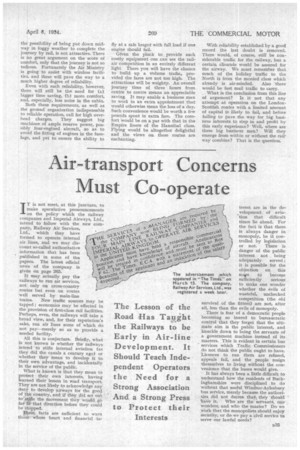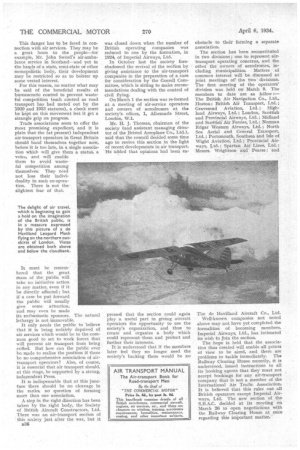Air-transport Concerns Must Co-operate
Page 53

Page 54

If you've noticed an error in this article please click here to report it so we can fix it.
IT is not meet, at this juncture, to make speculative pronouncements on the policy which the railway companies and imperial Airways, intend to follow with the new company, Railway Air Services, Ltd., which they have formed to operate internal air lines, and we may discount so-called authoritative information that has been Published in some of the papers. The latest) official news of the company is given on page 265.
It may actually pay the railways to run air services, not only on cross-country routes but even on routes well served by main-line trains. New traffic sources may be tapped ; economies may be effected in the provision of first-cIass rail facilities. Perhaps, even, the railways will take a broad view, and, for their reputation's sake, run air lines some of which do not pay—merely so as to provide a needed facility. , All this is conjecture. Briefly, what is not known is whether the railways intend 'to stifle internal aviation (as they did the canals a century ago) or whether they mean to develop it to their own advantage, and incidentally in the service of the public.
What is known is that they mean to protect their own interests, having learned their lesson in road transport. They are not likely to acknowledge any duty to 'develop airways for the good of the country, and if they did set out to' stifle the movement they would go far in that direction before they could be stopped.
These facts are sufficient to warn those whose 'heart and financial in
terest are in the development of aviation that difficult times lie ahead. For the fact is that there is always danger in monopoly, be it controlled by legislation or not. There is danger of the public interest not being adequately served ; it is possible for the objection on this save to become
sufficiently serious to make one wonder whether the evils of wasteful, unchecked competition (the old survival of the fittest) are not, after all, less than the evils of monopoly.
There is fear of a democratic people becoming so inured to bureaucratic control that they forget that the ultimate aim is the public interest, and knuckle down to being the servants of a government machine instead of its masters. This is evident ha certain bus services which Traffic Commissioners do not think the public ought to have. Licences to run them are refused, appeals fail, and the people resign themselves to living without the convenience that the buses would give.
It has always been a little difficult to understand how the residents of Buckinghamshire were disciplined to do without that useful Windsor-Aylesbury bus service, merely because the authorities, did not decree,. that they eheuld 'have in Who are the servants, one wonders, and who the master? Do we _Work that the monopolists should enjoy security, or do we pay a Civil service to serve our lawful needs? This danger has to be faced in connection with air services. They may be a great boon to the people—for example, Mr. John Sword's air-ambulance service in Scotland—and yet in the hands of a state, semi-state or other monopolistic body, their development may be restricted so as to bolster up some vested interest.
• For this reason, no matter what may be said of the beneficial results of bureaucratic control to prevent wasteful competition (such control as road transport has had meted out by the 1930 and 1933 statutes), a check must be kept on this movement lest it get a strangle grip on progress.
Trade associations seem to offer the most promising expedient, and it is plain that the (at present) independent air-transport operators in Great Britain should band themselves together now, before it is too late, in a single association which will give them a status, a voice, and will enable them to avoid wasteful competition among themselves. They need not lose their individuality in such co-operation. There is not the slightest fear of that.
It must be remembered that the great Mass of the public will take no initiative action in any matter, even if it be directly affected; but if a case be put forward -the public will usually give some attention, and may even be made its enthusiastic sponsors. The natural lethargy is not-immovable.
It only needs the public to believe that it is being unfairly deprived of air services which would be to the common good to set to work forces that will prevent air transport from being stifled. But how can the public ever be made to realize the position if there be no comprehensive association of airtransport operators? Also, of course, it is essential that air transport should, at this stage, be supported by a strong, independent Press.
It is indispensable that at this juncture there should be no cleavage in the ranks, no question of forming more than one association.
A step in the right direction has been taken by the right body, the Society of British Aircraft Constructors, Ltd. There was an air-transport section of this society just after the war, but it B36 was closed down when the number of British operating companies was reduced to one by the formation, in 1924, of Imperial Airways, Ltd.
In October last the society foreshadowed the revival of the section by giving assistance to the air-transport companies in the preparation of a case for consideration by the Gorrell Committee, which is sitting to make recommendations dealing with the control of civil flying.
On March 1 the section was re-formed at a meeting of air-service operators and owners of aerodromes at tha society's offices, 1, Albemarle Street, London, W.1.
Mr. H. J. Thomas, chairman of the society (and assistant managing director of the Bristol Aeroplane Co., Ltd.), said that the council decided some time ago to revive this section in the light of recent developments in air transport. -He added that opinions had been ex
pressed that the section could again play a useful part in giving aircraft operators the opportunity to use the society's organization, and thus to create and organize a body which could represent them and protect and further their interests.
It is understood that if the members later feel they no longer need the society's backing there would be no obstacle to their forming a separate association.
The section has been reconstituted in two divisions ; one to represent airtransport operating concerns, and the other the owners of aerodromes, including municipalities. Matters of common interest will be discussed at joint meetings of the two divisions. The first meeting of the operators' division was held on. March 9. The members to date are as follow :— The British Air Navigation Co., Ltd., Heston; British Air Transport, Ltd.; Gravesend Aviation, Ltd. ; Highland Airways, Ltd. ; London, Scottish and Provincial Airways, Ltd.; Midland and Scottish AirFerries, Ltd, ; Norman Edgar Western Airways, Ltd.; North Sea Aerial and General Transport, Ltd • Portsmouth Southsea and Isle of Wight Aviation, Ltd.; Provincial Airways, •Ltd.; Spartan Air. Lines, Ltd.; Messrs. Wrightson and Pearse ; and
The de Ha,villand Aircraft Co., Ltd.
Well-known companies not noted above may not have yet completed the formalities of becoming members. Imperial Airways, Ltd., has intimated its wish to loin the section.
The hope is held that the association thus created will enable all points of view to be aired, and there are problems to tackle immediately. The Railway Clearing House recently, it is understood, issued instructions to all its booking agents that they must not accept bookings for any air-transport company that is not a member of the International Air Traffic Association. It is believed that this rules out all British operators except Imperial Airways, Ltd. The new section of the S.B.A.C. decided at its meeting on March 26 to open negotiations with the Railway Clearing House at once regarding this important matter.




































































































